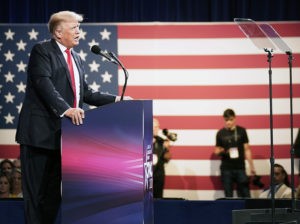After writing six opinion pieces for Baptist News Global about former President Donald J. Trump, I felt his defeat signaled that I would not need to spend any more time or effort treating him as the subject of a new article. But I was wrong.
A July 12 CNN broadcast reported that the United States Justice Department had released two new videos of the violence accompanying the Jan. 6 attack on the Capitol building by Trump supporters. Capitol police officers were defending themselves as they were assaulted by the angry mob, wielding flagpoles bearing red (Confederacy or white Christian nationalism) or blue (Trump 2020) flags on them. There was shouting, cursing, open threats, the crash of heavy objects thrown at police riot shields and the punches and grunts of brutal hand-to-hand combat.

Former president Donald Trump speaks at the Conservative Political Action Conference Sunday, July 11, 2021, in Dallas. (AP Photo/LM Otero)
Yet, as reported by CNN, Trump — in his 90-minute speech the day before, July 11, at the Conservative Political Action Conference in Dallas — repeated amid loud cheering his familiar political schtick, claiming, “We were doing so well until the rigged election happened to come along.” For 90 minutes, he used the stage to excite his adoring audience, at times variously acting victimized or victorious. Naturally, the Big Lie that the election had been stolen from him by Joe Biden played a central role in his routine.
But the disgraced former president made a bigger and even more ludicrous claim to Fox News journalist Maria Bartiromo just before taking the stage. About the Jan. 6 rioters, Trump said: “These were peaceful people, these were great people. The crowd was unbelievable, and I mentioned the word love — the love in the air. I’ve never seen anything like it.”
Then concerning the interaction between the rioters and Capitol police, he stated: “There was also a lovefest between the police, the Capitol police and the people that walked down to the Capitol.”
As the CNN news anchor summarizes, Trump was “not just trying to whitewash what happened that day, but attempting to rewrite it.” These words are both contrary to common sense, or “preposterous,” and opposed to manifest truth, or “absurd.”
This is just wrong
I’ve been thinking for a while now about what Trump said. I sincerely believe my reaction to his words has nothing to do with his political party. In fact, if Joe Biden were to utter such ridiculous comments about something he had done despite irrefutable video evidence and personal testimony to the contrary, I would react exactly the same way. Elected leaders, regardless of their status, office or political party, are not above the law and should be held to the same ethical standards as all of us.
“If Joe Biden were to utter such ridiculous comments about something he had done despite irrefutable video evidence and personal testimony to the contrary, I would react exactly the same way.”
What the former president was saying was not about policy decisions or actions about which there can be two legitimate opinions. He was not speaking about matters characterized by fine-lined nuance or grayish unclarity. When President Biden comments on his administration’s response to the thousands of immigrants at the southern border, he is speaking of a matter of political policy that can and should draw legitimate disagreement in a democracy. But when Trump defended the Jan. 6 rioters — whom he pumped up in a prior speech and sent on a march to the Capitol on a mission of insurrection — by making claims that are absolutely contrary to observable fact, that should not be a matter about which there can be two legitimate opinions. It is just wrong.
Revisiting C.S. Lewis
Perhaps the famous trilemma often used by apologists to “prove” the divinity of Jesus might be borrowed and applied to Donald Trump. I intend no disrespect — certainly not to Jesus and not even to C.S. Lewis.
The British scholar-writer became an atheist at age 15 in Belfast, Ireland, but then converted to Christianity in 1931 in Oxford, England, while taking an evening stroll with his friend, J.R.R. Tolkien. Lewis became a popular lay theologian, although his teaching post was in medieval English literature, and he was especially lauded for his 1952 classic of Christian apologetics, Mere Christianity. In that book, based upon a series of BBC radio talks he gave between 1941 and 1944, Lewis suggested the three choices that face a person trying to decide who Jesus was — namely, “lunatic, liar or Lord,” sometimes referred to as “mad, bad or God.”
Lewis wrote:
I am trying here to prevent anyone saying the really foolish thing that people often say about him. “I’m ready to accept Jesus as a great moral teacher, but I don’t accept his claim to be God.” That is the one thing we must not say. A man who was merely a man and said the sort of things Jesus said would not be a great moral teacher. He would either be a lunatic — on the level with the man who says he is a poached egg — or else he would be the Devil of Hell. You must make your choice. Either this man was, and is, the Son of God, or else a madman or something worse. You can shut him up for a fool, you can spit at him and kill him as a demon or you can fall at his feet and call him Lord and God, but let us not come with any patronizing nonsense about his being a great human teacher. He has not left that open to us. He did not intend to … . Now it seems to me obvious that he was neither a lunatic nor a fiend: and consequently, however strange or terrifying or unlikely it may seem, I have to accept the view that he was and is God.
Lewis’ forced choices have been both praised and criticized, but it is nonetheless true that “lunatic, liar or Lord” is still a well-known trilemma today, although Lewis popularized it almost 70 years ago.
To my knowledge, the famous alliterated options never have been used concerning a person other than Jesus. Some may consider it blasphemous for me to apply these choices to Donald Trump. But they seem to apply.
He’s not Lord
Of course, I am not suggesting that he is lord, although some have seemingly given him their ultimate devotion. While he was president, in the process of being impeached, Republican Congressman Barry Loudermilk of Georgia compared what Trump was enduring to the “sham trial” of Jesus Christ. During those contentious days, other supporters of the 45th president were comparing him to biblical royal figures like King Cyrus, King David and Queen Esther or — more shockingly — as the Chosen One, King of Israel, Second Coming of God, or Savior.
“Of course, I am not suggesting that he is lord, although some have seemingly given him their ultimate devotion.”
The loyalty given the former president by members of his party in Congress, as well as millions of his supporters around the country, makes me wonder if their praise has inexplicably morphed into blind allegiance or even worship. Sadly, I must ask that question, too, of the 81% of white evangelical Christians who voted to send Trump to the White House for a second term and the 74% of them who still believe he was indeed reelected but not put into office because of widespread fraud.
Is he a lunatic?
Turning to the other two choices, is Trump either a lunatic or liar? Both of these options have famously been considered, and he has been accused of being one or the other by numerous critics.
First, is he a “lunatic”? The most recent example of this possibility is recounted in the book Peril, written this year by Bob Woodward and Robert Costa. They write that Chairman of the Joint Chiefs Gen. Mark Milley, deeply shaken by the assault on Jan. 6, “was certain that Trump had gone into a serious mental decline in the aftermath of the election, with Trump now all but manic, screaming at officials and constructing his own alternate reality about endless election conspiracies.” According to the authors, “Milley worried that Trump could ‘go rogue’”
So, worried that a war with America’s greatest competitor could be started by an unhinged Donald Trump in the last days of his administration, Milley called his counterpart in China to assure him that the United States was not planning any secret attack on his country.
A year ago, Trump’s own niece, clinical psychologist Mary Trump, said in her book, Too Much and Never Enough: How My Family Created the World’s Most Dangerous Man, that she believed her Uncle Donald (no relation to a famous duck) may have severe mental health issues, including narcissism, antisocial personality disorder and dependent personality disorder. A Yale psychiatrist, Brandy X. Lee, who has warned about Trump’s mental problems since he was elected in 2016, publicly stated that she was pleased that Mary Trump had drawn the same conclusions about her uncle that she herself had drawn.
He’s a documented liar
Not all Trump’s critics, including other psychiatrists, believe he is mentally ill. But is he a liar?
The Washington Post — certainly no fan of the former president — claims to have catalogued some 30,000 lies by Donald Trump. Some, according to a recent article on the BBC website, have been relatively inconsequential, such as his golf game or the weather at one of his rallies, while others are incredibly serious, like the dangers of the coronavirus or the results of the 2020 presidential election.
News editor Jude Sheerin acknowledges that other recent presidents like Lyndon Johnson, Richard Nixon, Ronald Reagan, the two Bushes, Bill Clinton and Barack Obama all were guilty of stretching the truth, making misleading statements or telling lies when it suited their purpose. But, Sheerin suggests, Trump has been the biggest liar of them all.
“Donald Trump is the Frankenstein’s monster of a political system that has not merely tolerated lies from our leaders but has come to demand them.”
She quotes Distinguished Professor of Journalism at CUNY’s Brooklyn College, Eric Alterman, who has written a book on the subject of lying U.S. presidents. Alterman says: “We’ve tolerated presidential lies ever since the beginning of the republic. But Donald Trump is the Frankenstein’s monster of a political system that has not merely tolerated lies from our leaders but has come to demand them.” Sheerin thus concludes, “By the sheer volume of (Trump’s) mendacity, (he) has destroyed the very idea of shared truth in American politics.”
Are those the only three choices?
Lunatic, liar or lord? Conservative American biblical scholar Craig Evans says that when used to argue for the divinity of Jesus, Lewis’ alliteration is clever, perhaps even rhetorically sound, but his argument’s logic is faulty, because he offers only three choices.
When it comes to Trump, I must accept the overwhelming evidence that he is a liar. And I believe I learned enough in my college psychology minor to at least suspect he suffers some clinical mental problems. Let me be clear, however, that I most certainly am not suggesting that he is lord.
But are these three options the only possibilities? Aren’t there any other choices? Perhaps I am no less potentially guilty of faulty logic here than C.S. Lewis. Maybe Donald Trump cannot be adequately summarized as one of only these three L’s. Perhaps there are other ways to describe him: shrewd politician, fierce competitor, genius communicator, self-sufficient loner, injured party.
I wish he were no longer in the national spotlight, yet it appears that Trump will be in the news for a long time to come, indeed. He has not announced whether he will run again for the nation’s highest office, but if that is the case a lot of people will need to make an important political choice. No matter how you decide to view the political phenomenon that is the Donald, it feels impossible for me to ignore C.S. Lewis’s troublesome trilemma.
Rob Sellers is professor of theology and missions emeritus at Hardin-Simmons University’s Logsdon Seminary in Abilene, Texas. He is a past chair of the board of the Parliament of the World’s Religions in Chicago. He and his wife, Janie, served a quarter century as missionary teachers in Indonesia. They live in Waco, Texas.
Related articles:
Trump is lying. We have to keep listening | Opinion by Brett Younger
We knew there would be a reckoning for religious leaders enabling Trumpism, we just didn’t know it would be today | Opinion by Mark Wingfield
It’s past time to admit the hard truths behind the Capitol riots | Opinion by Wendell Griffen


